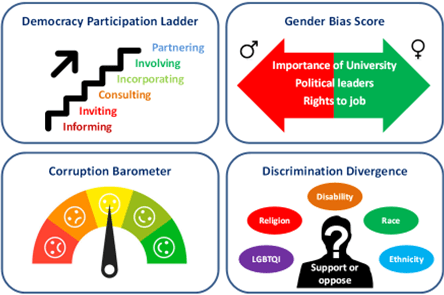Democracy is a complex and loaded term, applied in myriad ways. Democracy means more than just the rule of the majority, and when we talk about healthy democratic institutions and mean something more than just systems which respond to elections. So, how do we measure a democracy?
Four principles of democracy commonly referenced are equity, accountability, transparency, and participation. In terms of their meaning to democracy:
- Equity is the concept of justice and fairness between society and individuals, including the equal distribution of wealth, opportunities, and privileges.
- Accountability in a democracy means citizens delegate power to elected officials through periodic elections to represent or act in their interests. Those elected officials have a responsibility to those citizens to uphold those values – and are held to account if they do not.
- Transparency means citizens have access to information about what the government is doing and are thus more able to hold the government to account.
- Participation means not only that every citizen has to possess the opportunity to vote for their representatives in the government, but that they are actively engaged citizens; they have faith in the systems and thus see the meaning in becoming engaged.
The concepts listed above are commonly associated with a healthy democracy, and as ways of thinking about what democracy means. Rapid Asia wanted to develop practical tools to visualize and measure democracy, applying some of the principles above, while also recognizing divergence in how individuals experience any given system.
Four examples of how different aspects of democracy can be measured are shown in Figure 1.

Figure 1: Democracy indicators
The review helped to identify some key themes to help understand women and girls’ vulnerability and discrimination in disasters – these themes are:
- The Ladder of Participation: this concept is sometimes referred to in academic literature. It depicts the extent to which citizens participate in local governance, ranging from being informed about decisions that were already made (without them) to being the leaders of new initiatives. The ladder has six levels, and the average shows where participants see themselves at a particular time.
- Gender Bias Score: this tool examines responses to several gender bias statements. The extent to which people agree or disagree with the statement determines whether their attitude towards gender issues is generally negative or positive. The Gender Bias Score is the aggregated average across the questions. The higher the score, the higher the gender bias.
- Corruption Barometer: this tool examines responses to examples of corruption to see if people can correctly identify them. The results represent the average knowledge of corruption.
- Discrimination Divergence: there are other forms of discrimination aside from gender-based discrimination. This tool examines whether people would support or oppose an elected official from some minority groups (such as ethnic or religious minorities).
These tools highlight some of the key challenges facing the democratic ideal and identify ways to build better, more open, resilient systems that genuinely encapsulate the voices of all citizens. The multi-faceted nature of democracy can be explored and understood more fully using these tools. They can help highlight where there are weaknesses in the system that potentially can corrode democratic institutions, like corruption and lack of participation.
If you found this article useful, please remember to ‘Like’ and share on social media, and hit the ‘Follow’ button never to miss an article. You may also want to read this article: Measuring social norms.
About the authors: Daniel Lindgren is the Founder of Rapid Asia Co., Ltd. a management consultancy firm based in Bangkok that specialises in evaluations for programs, projects, social marketing campaigns and other social development initiatives. Leilana Quinger is an independent consultant working with Rapid Asia as a member of their expert panel of consultants.
